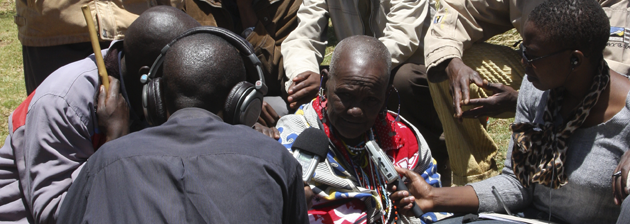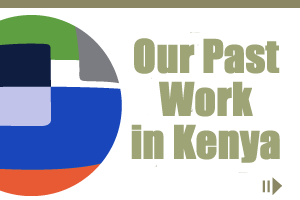"Journalists are like Doctors. If they do not treat people well, they die", said Mr. Wachira the vice Chairman of the Mau Narok Peace Committee set up by the Rift Valley Provincial Commissioner. He was speaking at a community and media peace forum recently organized by Internews in Tipis, Mau Narok. In this forum, over 70 members of the Kikuyu and Maasai communities critiqued the way journalists cover land disputes in their area.
To start the community and peace forum, the community listened to a feature story done by Lexy Mbogho of Radio Amani on the Rose farm land conflict. Participants were given a chance to share their views on news coverage by journalists. They appeared to be well informed on the media and the challenges journalists from Central Rift face. They mentioned corruption, Influence of media ownership, lack of research on conflict issues and use of file photos that don’t depict current situations as some of the key issues affecting the quality of journalism in the region. The different communities also seemed to prefer some media houses depending on their coverage and ownership.
The forum discussed the causes of land conflicts in Mau Narok and suggested a way forward. The Maasai community accused the Kikuyu community of not supporting them in claiming their "ancestral land", while at the same time wanting them to unite as the Mau Narok community.
"We should not dwell too much on history, because all of us migrated from somewhere", replied Mr. Wachira. "In Mau Narok there is no settlement scheme: the land was returned to Government who sold it to individuals", he added. This was in response to questions raised about the legitimacy of ownership of large parcels of privately owned land that the Maasai community wants back.
“Maasais don’t want to fight any Kikuyu or any IDP”, participants agreed. “But why does the government not take IDPs back to where they came from instead of settling them on pieces of land which are already disputed? asked Elder Ole Naikumi. “Are there more important communities than others?" he challenged.
"We don’t want outsiders to get our land. We do want our land back" said participant Mr. Maranka. "We will then share it with any other community in Mau Narok because they are now locals born and bred here".
The community decided that the way forward was peace and unity. To achieve this, the Maasai community agreed to involve other communities in their meetings. They also promised to restrain from invading and destroying private property in the area and said that retaliation would not being supported.
The participants appealed for a leaders roundtable organized by Internews to deal with the issues key highlighted during the unique forum. This they believe would have a greater impact. Internews responded positively to this appeal: a roundtable discussion was held in June, in Nakuru. It involved Church leaders, Peace committee representatives, civic leaders, village elders and the local administration.
| Voices from the Community: | |
| Part 1 : | |
| Part 2 : | |




